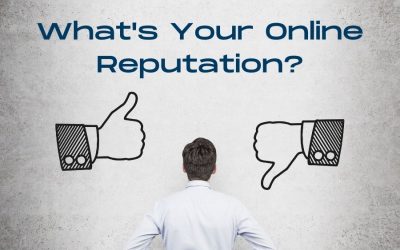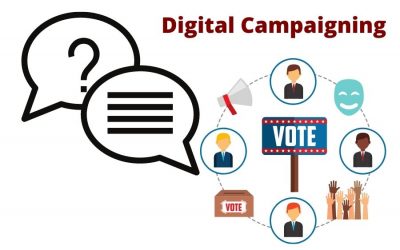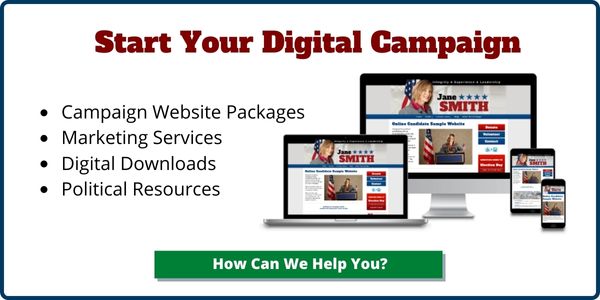How To Win A Local Election (When You’re Broke)
It doesn’t matter if you have a better grasp of the issues. It doesn’t matter if you have better qualifications than your opponents or you are a more eloquent speaker. The fact is, if you raise and spend less money than your opponent, you are much more likely to lose your election.
In fact, 90% of the time, the better-financed candidate wins. That said, it’s virtually impossible to win a political campaign with no money.
Candidates get their funding in a number of ways. Being personally wealthy certainly provides a significant advantage when running for office. Rich candidates can self-fund their campaigns and do not have to worry about raising money. They also tend to have a circle of friends and acquaintances who can make substantial donations. That lessens the need for more ‘grassroots’ or small donations from individual donors.
But let’s assume you are not wealthy. Let’s assume you are broke, or nearly broke. You don’t have much of a budget, but you still want to make a run for office.
That means you must fundraise and build a donor base. Local races usually cost several thousand dollars to run. But if you are running for Congress or state office, you’ll need to raise a lot more money. According to USAFacts, the median fundraising amount for Senate race winners was $5 million in 1996, when adjusted for inflation. By 2018, it had risen to $11 million. In that year, the eight successful Senate non-incumbents spent an average of $23.8 million.
The costs are even higher today. Because of this, working-class people may find it extremely difficult to afford a run, especially for federal office.
Even for local school board or town council races, you’ll still need to raise and spend a significant amount of money.
Here is a basic outline for winning a political campaign without much money:
- Put together a strong team
- How much money do you need to win an election?
- Raise initial funds to get started
- Open a campaign bank account
- Friends and family – your first donors
- Set up your ways to accept donations
- Throw a kick-off fundraiser
- Leverage influencers
- Leverage your grassroots efforts
- Leverage technology to win
- Always follow the law
- Conclusion

A political candidate with no money is in for a tough race…
How to win a local election – Put together a strong team
One of the most important parts of any political organization is the campaign team. Those positions include the campaign manager, fundraising manager, event coordinator, volunteer coordinator, finance director (treasurer), and grassroots coordinator. Larger organizations may have additional positions such as a communications and advertising director.
Local candidates, like those for the school board or city or town council, may not have a large team. If you don’t have money to hire staff, you’ll need to leverage your friends and supporters to handle the various roles. Everyone involved should know the chain of command and where they fit in the organization.
In small municipal races, one person may handle several roles in running an effective grassroots organization. What your campaign lacks in size, you will need to make up for in strategy.
A dedicated team can perform more effectively than a large team. Focused volunteers and staff can be extremely productive if they are committed to helping you win a political campaign. (This is how to win an election as an underdog candidate.) Hiring the right people can be a big advantage, but that can be done as the organization grows.
How much money will you need to win the election?
Winning a local election starts by getting your finances in order. To start, you should determine your foreseeable expenses and make a budget. That will tell you how much money you will need for the campaign. This includes signage, print and online ad spending.
How many mailers you’re going to send out? What staff, if any, are you going to hire? What other expenses do you expect to incur? The amount can be influenced by several factors. If you face a primary or are up against multiple opponents, you may find that you need a greater budget.
Look up how much money was spent by the winner of the last few elections. That should give you an idea of how much you should expect to raise and spend.
To achieve that number, you’ll need basic fundraising plan. Say you determine that you need $25,000 to be competitive in the race. Your donor breakdown could look something like this:
50 donations of $500 = $25,000
125 donations of $250 = $25,000
250 donations x $100 = $25,000
500 donations x $50 = $25,000
1,000 donations x $25 = $25,000
You’ll need a mix of larger and smaller contributions to reach your goal. That’s where your donor research will come into play. You will segment your donor requests based on past history. It makes no sense to ask wealthy donors to contribute $25 when they have a history of contributing larger amounts to similar races.
Besides money, you must know how many votes are required to win. Research into the past few cycles and find out how many votes the winner received. Winning candidates focus on the number of votes they need to win. To get an average cost per voter, divide the amount of money you need by the number of votes required.
Now you have your financial goal and total voter goal.
Even the greatest was once a beginner. Don’t be afraid to take the first step.
—MUHAMMAD ALI
Raise initial funds to get started
 Figuring out how much money you need is the easy part. Now it gets a little more complicated as we put together the pieces of your campaign’s finances.
Figuring out how much money you need is the easy part. Now it gets a little more complicated as we put together the pieces of your campaign’s finances.
At this point, let’s assume that you have already established a political committee with your local county Board of Elections.
You’ll need a campaign treasurer to track income and expenditures and handle financial reporting.
Open a campaign bank account
In most jurisdictions, you need a campaign bank account in order to legally deposit political donations. Consider using a local bank, if you can. Here is information on how to open a political campaign bank account.
Friends and family – your first donors
To start, you will need initial seed money. This can be tough for first-time candidates who cannot self-fund. The first people that you will ask to give will be your friends, family and other wealthy supporters you know.
When asking, you should explain why you are running and how their initial support can help. Your initial backers will be some of your strongest advocates going forward. They’ve made an investment in you and your election. They want to see you succeed.
It may be difficult, but if you don’t ask for money, you won’t get any.

Set up ways to accept donations
At this point, you should already have a website in place. While checks are nice, you should be able to offer the ability to make online donations right from the start. A political campaign website can be easily created, makes your budding organization appear established, and it provides a fixed place to send donors.
Next, you’ll need a way to accept donations online. There are a variety of online fundraising services. Some are partisan, most are not. Many services incorporate social sharing, e-ticket sales for events and other viral tools. They are geared for the reporting requirements of states or the FEC.
Some candidates today are ‘testing the waters’ by using crowdfunding services to secure initial financial support. You can get pledges of support before establishing a formal run. It’s a technique that has become more popular for many down-ballot candidates.
Throw a kick-off campaign fundraiser
Once you’ve raised some seed money, you’ll soon have your first opportunity to spend it. Kick off your official campaign by having an event. Some make their initial event free, in order to attract more people to hear the candidate’s message. Other campaigns may make the kickoff event a fundraiser. It’s up to you.
Eventually you will need to host an initial fundraiser. For local candidates, you can go with a number of political fundraising ideas. You may want to go simple, such as an event held at at a friend’s house, a local restaurant or a part. You may want to charge $25 or $50 a person.
Put together a press release (and press packet) to announce your event. Submit it to your local newspapers as a way to announce your candidacy. Promote the event online through your social media and email contacts.
When planning a kickoff event, you will need to front some money to cover expenses. Make sure your event costs and attendee pricing is set up so you will have a positive return on investment (ROI). The last thing you want is to have a fancy event and actually lose money on it at the end of the day.
 Join our email list for this free guide and more.
Join our email list for this free guide and more.
Leverage influencers
Find the influencers in your district. These can be individuals or organizations. Be engaged with your local party. They can provide substantial support in the form of donor lists and other information. (But don’t necessarily rely on them for financial backing.)
If you can identify and reach individual and group influencers, then you can leverage their connection networks. For example, non-profit groups may not be able to publicly support a candidate, but you may be able to speak at group meeting. Individuals may help you set up meet-and-greets or host additional fundraising events.
Start early and lock up key endorsements as soon as you can.
Leverage your grassroots efforts
If you can’t afford traditional advertising, you’ll need to boost your grassroots efforts to get your name out there to voters.
A grassroots campaign is about getting your message to the masses on a one-to-one level. These activities can include:
- Door to door canvassing – and target your audiences with specific messaging.
- Literature drops
- Voter registration efforts
- Social media – viral media targeting local issues.
- Events and fundraisers
You’ll also need yard signs to boost name recognition. You may want to start with a small number early on just to get your name out there.
“The basic job of any campaign is to translate grassroots energy into turnout.”
– Jon Ossoff
Leverage technology to win your election
In all aspects of your campaign, make sure you leverage technology to accomplish your financial and person-to-person goals.
- Social media – Use Facebook and Twitter to promote your campaign events. Don’t use personal accounts for your campaign. However, you will want to encourage your personal followers to follow your campaign social media accounts. Facebook advertising is affordable and can be well-targeted to reach specific voter segments. You will want to have your campaign verified well in advance before you start running any ads.
- Campaign website – Keep your site up to date with events and news. Make it an inviting place for voters to learn more about you and the issues that effect them. It’s also your donation hub, so you’ll leverage it to raise money. Campaign websites do not need to cost a lot of money. (Use Online Candidate for your political web design needs.)
- Accept online donations – Depending on your platform, you can set up donation forms on your website, through email links and through social media. Be sure to track what channels your contributions come through. It will help you become more effective in asking for more support throughout the election cycle. Set up recurring online donations through your fundraising platform so donors so can keep supporting you through Election Day.
- Email – This can be one of your most effective digital channels. Start building your email list as soon as you can, starting with friends and relatives. Put a signup form on your website and add emails from offline sources (with permission, of course).
- Online advertising – You can advertise on social media, through pay-per-click, through banner advertising on local news sites, through retargeting, P2P text messaging and IP targeting. Those take money, of course, but my the end of the campaign, you should have some money available to advertise and get out the vote.
Always follow the law
You need to know the campaign finance laws and regulations of your state. If you skirt the law, even inadvertently, it can cause problems. It’s a distraction you don’t need and an advantage you don’t want to hand to an opponent.
In conclusion
Let’s face it. You can’t win an election without raising money at some point. The best strategy is to start early, be organized, and leverage every advantage you can. With limited resources, it’s all about getting more votes for less time and less money.
Good luck!
Create an affordable political campaign website with Online Candidate. We help hundreds of local and grassroots campaigns every election cycle.
Online Reputation Management for Political Candidates
When voters search your name on the internet, what do they find? Are the results good, harmful, or just random? Whatever the case may be, as a political candidate, you can take control over search engine results and minimize or even eliminate unfavorable content.
Your online reputation is how you are perceived online. It’s what people are saying about you. And perhaps more importantly, it’s the personal information about you or your campaign that voters find online.
There are probably a few things about you right now that you don’t want a voter to see. There may be negative news articles, blog posts, or comments published about you that are less than complimentary to your candidacy.
You can influence search results rather than leaving it up to chance. The most straightforward strategy for dealing with online reputation management for politicians is to create new, positive information that ‘pushes down’ negative search results.
Sometimes your reputation is out of your control
 A few years back, we had a client who had the same name as a person who had recently committed a serious crime.
A few years back, we had a client who had the same name as a person who had recently committed a serious crime.
Searching Google for that candidate pulled up his campaign website – along with news articles detailing an alleged murder that ‘he’ committed.
Except it wasn’t the candidate. It was someone else who shared the same name.
Another client shared the name of a former US President. There was no way he was going to get any of his material to appear for just a name search.
The solution?
It took some work, but both clients were able to have their information appear for name + location and name + position searches.
Sometimes that’s as good as it gets.
Ways to improve a political candidate’s online brand
Make a website for your campaign
One of the most effective strategies for managing your online presence is to create your own campaign website. The best part about having your own website is that you have complete control over your messaging. For online reputation purposes, the candidate’s name should be included in the domain name. Top search results often include domains that contain the search phrases.
Many online reputation firms recommend creating multiple, but unique websites. For example, you can create other sites focusing your business or profession. Those additional sites can show up on search results, especially if the domains contain a variant of your own name.
Create outside accounts and social media profiles
Social media profiles for Facebook, Twitter and LinkedIn often appear near the top of search results. The same goes for popular professional profile sites such as LinkedIn and AboutMe.
Get some positive news coverage
News outlets rank well online. Inform the media about your campaign launch and other major events. If you can, have them include a link to your campaign website in any articles that cover the election.
Create new content about yourself
Update your website with new material. Post and share content to your social media accounts. Do online interviews, press releases, video, and more. Work to build a good body of content that promotes your campaign and enhances your digital footprint. This is the material that will crowd out other, negative material.
Use links to build relevancy
Cross-link what you control. From your website, link out to your social media accounts, and have your social media accounts link back to your website. By linking to select outside material, this can influence what appears for specific searches. Link to stories that are favorable to you and unfavorable to your opposition.
Keep track of what people are saying about you. Social media monitoring refers to the process of tracking conversations and mentions related to a candidate, the issues, or the election across various social media platforms. You can set up tools like Google Alerts, Mention, or Talkwalker to monitor and provide alerts. Besides keeping tabs on your own name, be sure to monitor your opponents and news about important issues.
With today’s 24/7 news cycle, you never want to be caught surprised.
With some work, you can keep positive content appearing for related searches. If you can get negative material pushed down past the first page results, you’ve done a great job because three-quarters of people never look past the first page of search results.
Local elections can be won by building a good reputation, online and offline. That means politicians need to be visible and active in their community. They should make sure they are present in public places, attend community events and make themselves available for interviews. That is how voters get to really know the person on the ballot.
In politics, messaging matters. Take control of yours!
Additional Articles:
- Creating Your Online Identity – What information should you put about yourself online – and where should you put it? [Online Candidate Resources]
- 5 Things Candidates Should Never Do Online
- SEO Strategies for Political Campaigns
For more online campaigning tips and strategies, check out our book, Running for Office as an Online Candidate.
How Much Does a Political Website Cost?
A website is the digital front of every political campaign. A campaign website is the first point of contact that potential voters have with a candidate or cause. It is a crucial tool for any candidate running for office, as it is used to promote the candidate, their platform, and their background.
The cost of creating a political campaign website can range from free with a DIY builder to thousands of dollars with a custom design. Those prices are determined by the needs of the site and its complexity.
If you’re looking to build a political website, you’ll need to choose between two main options:
- Hiring a web design company. This is usually expensive and time-consuming, so it’s only recommended for larger campaigns with deep pockets.
- Doing it yourself. If you have some knowledge of HTML or just know how to use Microsoft Word, then this might be an option for you.
Fortunately, Online Candidate provides both options. We provide the domain, hosting, and design, built-in forms, hosting, and more—all with simple, affordable pricing.
A website builder for those who want to ‘do it yourself’
Our basic Lite Website Package and Monthly Option include a free .com domain registration, hosting, and our political website builder. The builder allows you to pick your own header graphic, fonts, and color schemes. You can upload your own header graphic or upgrade and have us design a logo for you. These packages are popular with candidates running in local races.
Our Monthly Website Option is geared for clients that do not want to go with one of our website packages and prefer month-to-month billing. Choose from a wide selection of header images, color styles, and font types to create a unique look. Then add your content and go live.
The Monthly Option price is $29/month and includes recurring billing that can be cancelled at any time. Our Lite Website Package includes six months of hosting and has a one-time price of $149. (You can extend your hosting if you choose.)
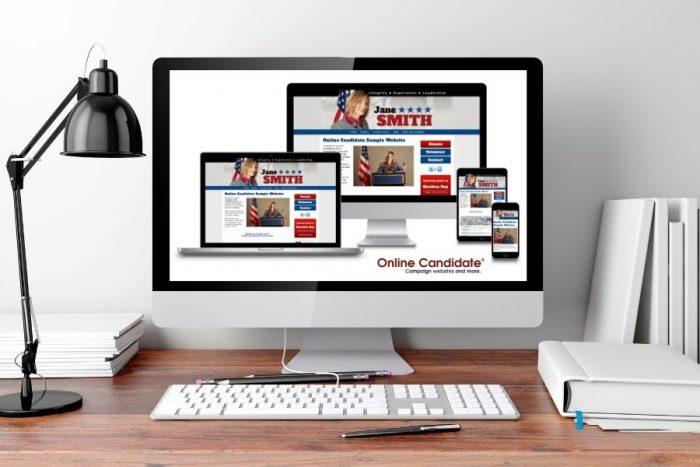
Or we can design and build your site for you
Generally, the price for a custom website is not fixed. It can depend on the size and complexity of the website. For example, a site requiring a small number of pages may cost less than one with many pages, different page layouts, and other added features.
By offering fixed-price website packages, Online Candidate avoids this. Our Regular Campaign Website Package and our Enhanced Campaign Website Package both include professional design customization. With the Regular Package, you add your own content. With the Enhanced Package, we set up your initial content for you. These packages are recommended for larger campaigns for Congress or state-wide elected offices.
Both packages include site design customization. Need a campaign logo design? We’ll create a logo in a high-resolution format that you can also use for print. We’ll arrange your copy and images and optimize your content for search engines. After that, it’s all in your control.
- Regular Package Price: $459, one time cost. Includes a custom design.
- Enhanced Package Price: $699, one-time cost. Custom design and content setup are included.
Both packages include the Online Candidate website platform and site tools, free domain registration, custom site design, initial site content setup, and 12 months of hosting. (You can extend hosting after that period.)
Get our Online Campaign Tips Guide.
It’s FREE right now!
How can we price our political campaign websites so affordably?
We’ve had clients who have used free website builders and found them too difficult or time-consuming. Others have told us that they have been quoted hundreds, if not thousands, of dollars. Generally, a reputable freelance web developer will charge at least $1,500 for a basic website. The price can go up to $5,000 or more for a more sophisticated site with custom functionality.
With Online Candidate, we have our own custom content management system that is specifically created for political candidates. Most of our clients do not have much experience in web design, and don’t have a large budget for custom programming. Our platform includes all the standard pages, widgets, and initial configuration right from the start.
Built-in design options include header graphics, customizable color schemes, an image library, and more. Everything is already set and optimized for political needs, so there’s no need to “recreate the wheel.”
For custom design or content setup, have a process that allows us to build out your site within 2–4 business days. We try to make the process as painless as possible, so we can get your site launched quickly.
Clients also get free access to OnlineCandidateResources.com, which contains social media templates, letter generators, AI-powered content generators and more.
We look forward to helping your campaign!
Political SEO Strategies for Campaigns and Candidates
What’s worse than a candidate not having a campaign website? It’s having a website that no one can find. Search engine optimization (SEO) is a way of creating your content to make your site more attractive to search engines and helping it rank higher for related queries.
Why is SEO important for politicians? It’s not just social media that has an influence, but according to studies, search rankings can even have an influence over voters. Politicians or public figures should look to political SEO as part of an overall campaign marketing strategy.
To improve your site rankings on Google, Bing and Yahoo, use these basic strategies:
Optimize your political campaign website
A political candidate website needs optimization to increase online visibility. When a voter searches for a political candidate, the official website of the candidate should appear in the first search result, followed by related social media profiles and content. There are several elements that can help achieve a top ranking position.
Start with the right domain name
The domain you pick for your website is important for search optimization. Choose a clean, succinct domain that is adaptable for print and potentially reusable for future campaigns. The candidate’s name or variant (johnsmith.com or votejohnsmith.com) often makes the best name. Keep your domain name short, and avoid using a year or elected position, as they may become irrelevant in the future.
Use proper page titles
The page title is an important search ranking element. Page title tags should clearly relate to their page. The page title is displayed in the top border of the web browser. This serves as an anchor so that the visitor knows where they are. Most web browsers only display the first 95 characters. If it is longer than 95 characters, browsers will simply crop the tag. Every page on your site should have its own unique page title.
Write interesting meta descriptions
The description meta tag is what usually displays as a link description in search engine result pages (SERPs). Create individual meta descriptions for each page. This tag is intended to be a brief and concise summary of each page’s content.
- Include the candidate name, elected position sought and the district or location.
- One or two sentences is best. Anything longer will get truncated.
- Each page should have it’s own unique description that describes the page, even if it is slight variant of the others.
- Try to make your page descriptions compelling, so people will want to click on the search result.

Make your page titles and descriptions relevant and compelling.
Optimize your images by including descriptions. Alt tags, also known as “alt descriptions” are used within HTML code to describe a page image’s appearance and function. For example, if you include a picture of a candidate, set your image alt tag as a description like, ‘Bob Smith, Candidate for TinyTown Mayor’. This will help your page rank for the candidate’s name, and there’s a good chance the image itself may appear in image search results.
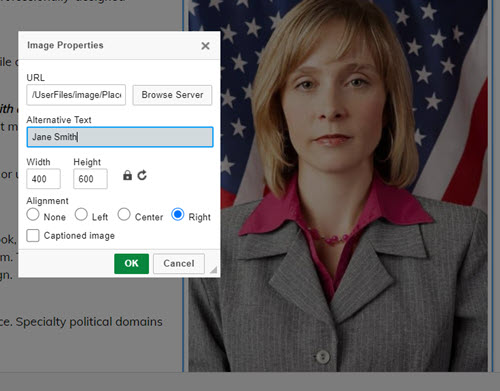
Add a description alt tag to your images, particularly your candidate head shots.
Page titles, description tags and image alt tags can be set within your Online Candidate Site Administration. Each sample page contains a description tag that you can customize.
One thing to watch for with images is how large you make them. Large image files can make a page load slowly. Google may penalize slow websites in rankings, so you’ll want your images to be sized properly in both pixel and file size.
You can check your site’s loading speed through Google’s PageSpeed Insights Tool. It will tell you your overall speed and give you feedback on how you can speed it up.
Your content should include the critical text necessary for Google (and visitors) to know who you are and what you are running for. This information should include your full location (including state), primary or election date, contact information and any appropriate disclaimers. More on this below.
Politics and relevancy: Create content that works
How relevant is your content to what is being searched? Optimizing starts with a good domain name. For example, if you can include the candidate’s name in the domain, that helps a lot. Most recent presidential candidates included their full name in the domain. This includes donaldjtrump.com, joebiden.com and hillaryclinton.com. You can’t get more relevant than the exact name.
A ‘thin site’ contains very little content. A ‘thin’ political website may just consist of a home page, contact page and maybe a donation page. With only a few content pages, there just isn’t enough meat for a search engine to know what the site is about. (Voters won’t glean much information, either.)
In our experience, we’ve seen clients who expand their content beyond a few basic pages quickly start to rank.
To get indexed properly, your website should have at least 8-10 pages of solid content. That includes your home page, about information, issue pages and blog posts. Don’t count contact, forms and disclaimer pages toward this number. The best way to put enough meat on your site is to write about what is important to your cause. This can be done through issue pages along with news updates and additional material.
Craft pages specifically for each major election issue.
Include relevant phrases (TinyTown traffic, traffic in TinyTown, Tinytown traffic problems, etc.) in your page title and throughout the body of your text, where appropriate. Break your text into manageable chunks and use subheadings to make your material readable and logical. Link out to related sources. If your page is about traffic, link out to relevant articles or online traffic studies addressing the problem.
Cross-link pages within your website.
Where it makes sense within the content of a page, link to your other pages. For example, you may have a list of important issues on your home page. You will want to link from the phrase ‘TinyTown traffic’ or ‘traffic in TinyTown’ directly to your issue page. This cross-linking will act as a signal to build relevancy. Avoid using generic links like, “Click here”.
Social media accounts are a big help.
Related links help build overall relevance, which help web pages rank for related queries. Social media accounts (not individual posts) provide valuable links back to your site. Make sure you add your site to your social media profiles.
In addition to internal links within your site, you’ll want to create backlinks (or links from other online sources) to your website.
Backlinks are the currency of the web
Links between websites help determine how and what appears in search results. Even having a few links can help your site start to rank in Google.
The easiest backlinks come from your social media accounts. In the profile section, make sure your social accounts link to your website. When you post new material to your site, make sure you share it through your social media accounts.
Inform newspapers and local news portals. Notify your local media about your latest updates or press release. This includes both local newspapers and sites that cover your geographic area. Use your press releases for this purpose. Again, if possible, have any web links from these sources point directly to specific issue pages rather than your site home page.
Target keyword phrases related to your election and the issues
The most important goal of a campaign website is to rank for a candidate’s name. This can be achieved with a solid SEO strategy. This includes having a website that focuses on the candidate and has relevant links from social media accounts and from articles about the candidate.
Let’s assume that you already have a website, and you’ve done enough to appear for candidate name and elected office queries.
Great, but that doesn’t mean your work is done.
What else are your voters and constituents looking for? What are the hot topics and issues of the day? Have you built pages addressing around them? This means making the page title, meta description and page content focused on a particular phrase or related phrases.
For example, during the 2020 presidential election, Joe Biden’s website was able to dominate on issue topics such as immigration, gun laws, healthcare and women’s rights. He was able to achieve results on Google over Donald Trump by having organized, targeted content that addressed those issues.
Ranking for a high-volume keyword may bring in a lot of traffic, but if that term is irrelevant to voters, what’s the point? Target political SEO keywords and phrases that focus on the narrow interests of your voters. Many of these keywords will be obvious to you, such as names, locations, districts and major local issues. Localized search results will be more relevant to the voters in your district.
There are also keyword tools, including using Google’s Keyword Tool or Facebook’s Insights.
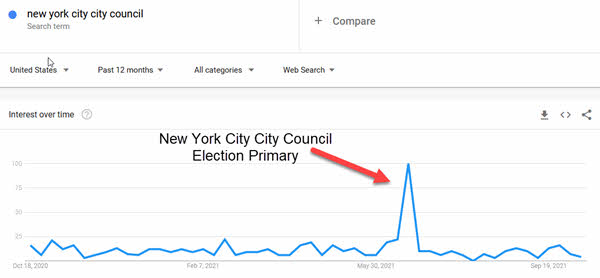
You can take advantage of larger trends and research what people are searching for.
With some time, you can have your own content appear in one or more top ten results for your target phrases related to your city, county, or state. It takes effort to map out your goals and put together a plan, but the results provide a healthy boost in traffic and exposure to voters.
And that’s the real goal of online domination!
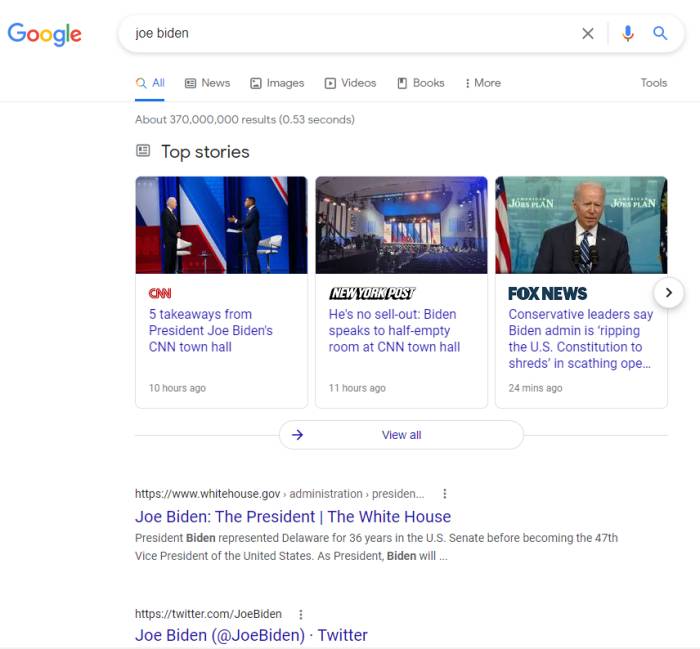
Search results including top stories for President Joe Biden.
Create search engine accounts to get indexed
Creating search engine accounts for your campaign is highly recommended. Start by creating a Google Account. You may have your own personal Gmail account, but you should create an account specifically for your organization.
Many of our clients create a campaign Gmail account as a way to get started. Accounts are free and allow you access to a number of useful services, including AdWords, Analytics, and more. The Google Search Console provides detailed information about your site’s visibility, what other sites link to you, opportunities to diagnose issues, and information on how visitors arrive at your site.
- Submit to Google Console at https://www.google.com/webmasters/
- Submit to Bing and Yahoo at https://www.bing.com/toolbox/webmaster.
Tip: Don’t submit your website until it is ready for public viewing.
Applying basic optimization tactics to your election website will go a long way to attract more traffic. That means more people to see your message – and potential volunteers and donors.
Manage your online reputation
The rise of the Internet has changed the way we do politics. It’s now more important than ever to protect your campaign from misinformation. Candidates need to keep an eye as to what appears in searches. This is an aspect of online reputation management.
Your online identity is important. The goal is to control online what appears about you and anything related to you.
- Your website and social profiles will generally tend to appear in the top results.Your social profiles should be complete and regularly updated in order for them to remain relevant.
- Using online reputation management strategies can help can keep positive content appearing in searches. If you have bad listings that appear, try to replace that material with more positive pages, optimized site content, press release and/or news articles.
- If you can get negative material pushed past the first page results, you are probably safe because the majority of people never look past the first page of search results.
A smart management strategy, along with online reputation monitoring will help keep you front and center before voters.
Using a political SEO campaign to help win your election
On the first campaign we worked on in 2003, we were able to promote negative news articles against and incumbent opponent. It got to the point where a search for the opponents name would only show a list of negative results. The opponent didn’t even have a campaign website until late in the season, but he still couldn’t overcome the unflattering content we had backlinked.
These days, it’s far more difficult to use these strategies against a political opponent. Your time and effort is better spent enhancing your own online reputation than trying to take down someone else.
We can help optimize your site
Having your content appear within the first page of results could be the difference between winning or losing an election. We can help with technical issues as well as improving your content to help optimize your site and improve rankings. Schedule a consultation to improve your digital strategy.
Online Candidate websites are SEO-friendly right from the start. Start your digital campaign today!
Related:
What Are The Easiest Political Offices To Run For?
Running for any political position is a challenge, but some are easier than others. You may not have much political experience or have an unconventional background. But if you know your community, just your local experiences will be advantageous.
You might be wondering where to start your political career, or if there is political office positions list that you can reference. Many first-time candidates, especially those from diverse backgrounds, don’t know what political office to run for—or even what opportunities exist.
Local political positions typically have less responsibility than national or state-level elected positions. Local offices may include offices such as mayor, councilman or woman, city council member, etc. Political offices at this level require little to no experience but come with low pay and little job security.
National and federal offices have more responsibility and often require higher levels of education, like an undergraduate degree in political science or law.
So, what public office position should I pick? If you are looking for an elected position that is easy to win, you probably want to target one that does not require a large and expensive campaign.
Key Points:
- Local positions to run for, like mayor or city council member, are generally easier to campaign for and win. These roles often require less political experience and involve smaller campaign efforts compared to higher offices.
- Joining local boards and commissions, which are typically appointed positions, offers an easier and alternative pathway into politics. These roles allow for community involvement and experience in governance without extensive campaigning.
- Running for non-partisan seats, often found in smaller cities and districts, can be simpler as it avoids the complexities of party politics. Additionally, uncontested elections, where there are few or no opponents, provide an easier opportunity to attain a political office.
What government offices and positions are available?
Local government seats are often easier to campaign for and win than state or federal offices. However, they can be just as important to the lives and welfare of constituents. Here are some offices that you may want to consider. The titles and duties vary depending on your state or municipality.
If you are looking to start a career of public service, consider running for these local government positions:
Local municipal governments are responsible for the governance of cities, town and villages. They oversee city-wide developments that affect their citizens and manage local services like schools, water supply, sanitation etc. City and town government create local laws and regulations to improve economic development to make their municipalities more desirable to residents, taxpayers and businesses. They also provide public funding to maintain civic infrastructure, which includes roads, bridges, parks, and recreational centers.
Local Elected Official Positions Include:
- Mayor
- City Council
- At-Large Councilman or Councilwoman
- Town Council
- Alderman
- Selectman
- Precinct Delegate
- Assessor
County governments are in charge of enforcing county and state laws and regulations. They provide public safety services to the people living in the county, including health care, sheriff and police protection, county courts, roads, and highway maintenance. The county is also responsible for the registration and authentication of vital events such as birth, marriage, and death records, voter registration, and election administration. They are also responsible for issuing certified copies of documents to individuals or organizations when requested.
A List of County Elected Officials Include:
- County Executive
- County Legislature / County Council
- District Attorney
- Coroner/Medical Examiner
- Auditor
- Sheriff
- Auditor
- Assessor
If you want to know more about your local elected officials, visit https://www.usa.gov/elected-officials. The site will provide you with a list of names and contact information for federal, state, and local elected officials, as well as their districts and population size.
One advantage of starting with a local position is that your district may be small enough for you to go door-to-door. This allows you to speak directly to voters and make personal contact. Many voters never have a politician pay them a visit. That personal touch provides a strong first impression and can help sway an opinion.

Canvassing as a local candidate impresses local voters and can help increase turnout.
For example, we knew a person in our town who had very strong opinions about a somewhat obscure topic. Fueled by this issue, she jumped into the political ring and ran for mayor. Rather than starting from a council position, she went for the top position in the village – and lost.
The next year she ran for an open board seat and lost.
A few years later, she ran again for the position of village justice. Again, she lost.
After failing to win her first election, her reputation took a hit. It was highly unlikely that she was going to win another local race going forward. Instead of continuing to run as a candidate, she might have accomplished her goals if she became involved in other ways…
Related:
- Should You Make The Run For Local Office?
- How to Run: Requirements for Office
- List of Political Candidate Training Programs
Get appointed to a local board or commission
The easiest political offices to seek are those that do not require any campaigning at all.
Elected jobs are not the only way to begin a political career. Local boards and commissions are only two examples of public leadership positions that are filled through appointments.
There is often a need by local government to find qualified people to serve on boards. In many cases, you simply need to volunteer. Commissions and boards work on county or city issues and make recommendations directly to government officials and the public.
Types of municipal boards and commissions include:
- School Board
- Zoning Commission
- Sewer Authority
- Water District Boards
- Advisory Boards
- Planning Committees
- Local Boards and Commissions Advisory Committees
- Specialized Public Service Boards and Commissions, such as the Illinois State Toll Highway Authority or Chicago Transit Authority
Joining a local board is a terrific opportunity to get involved in your community. It can also introduce you to some new skills and teach you how the government works. You will be involved in running meetings, working with data, making public presentations, and writing reports and recommendations. It also involves learning more about various issues and the legislative process.
As a member, you’ll also have some behind-the-scenes influence.
By being involved, you can build a network that can be useful when you make a move to an elected office. You will also learn about how various constituencies must work together to achieve adversarial goals.
Best of all, even newcomers can make an impact. They can bring new ideas and energy that can shake up a board or commission that’s always done things the same old way.

Getting appointed to a local commission can provide great experience in local law and government process.
Running for non-partisan seats
Often an open, non-partisan seat is easier to run for in local municipal or district elections. You can avoid party identification and run on your own positions. Nonpartisan elections are held in many smaller cities, towns, and villages, where no political party is listed on the ballot. School boards, judicial positions and special board positions are typically non-partisan.
A lack of political opposition makes winning an election easy
The easiest elected offices are those where no one else is running. Winning an election when you are the only candidate on the ballot almost seems like cheating, but it isn’t.
Incumbents who run unopposed in uncontested elections easily win term after term, even if they are unpopular. Sometimes there are times when no one runs at all for a position, leaving a vacancy. Those situations can offer an opportunity for someone to offer a new voice to voters.
Maybe that person is you.
Who can help you decide which position is best?
You might want to talk to friends or family members who can tell you what type of elected position would be appropriate, given your skills and experience. Perhaps you know a local politician who can provide guidance or an endorsement.
If you’re a member of a political party, get in touch with your local committee to get more information on possible positions that might be available. A party organization can provide access to voter demographics, historical data, e-mail, and address lists. A strong party backing can help you get on the ballot by providing resources to recruit volunteers and promote yourself to the public.
Before diving into politics, be aware of the expectations and work required for the position you seek. There are resources available to help train new candidates in the basics of running a successful campaign. Take advantage of educational resources early so you are familiar with the processes involved in leadership, fundraising, and voter contact.
The average person is not born with the skill set to be a politician. It takes a lot of hard work, dedication, and patience to get to that point.
Even if you decide that holding a political office is not right for you, there are other ways to get involved in your community. Consider joining a citizen board where you can help influence policy. Or you can work for a local organization or volunteer your time elsewhere.
Ready to start your campaign? From political website design to marketing, Online Candidate provides services to help you get your digital campaign up and running.
A List of Our Best Sheriff Campaign Slogans
As a candidate running for sheriff, you’ll want to stand out from your opponents. Good campaign slogans helps keep candidates in the minds of voters.
As sheriff, your actions as the chief law enforcement officer in your county or city gives you an active role in your community.
Here is a list of some of our favorite slogans for sheriff:
- Keeping our Community Safe
- For Effective Law Enforcement
- Character That Counts
- A Proven Record Of Excellence
- Experience Matters
- A Sheriff You Can Trust
- Community, Integrity, Commitment
- Courage. Character. Community
- Safer Streets, Safer Community
- A Sheriff For The People
- Proven Experience
- A Department Accountable to the Citizens
- Protecting our Neighborhoods
- Service to the Community
- Experience and Leadership
- Committed to the Community
- To Serve our Community
- A Leader for Tough Times
- [Location] Deserves Better
- Protecting the People
- Serving the Public Good
- A [County/City] Sheriff for All
Your chief policies and issues will help enforce the law and keep the peace. The election slogan as you run for office should best reflect the theme of your campaign.
Voter turnout for local elections for sheriff can be low. There is not always a clear way to know when sheriffs and prosecutor offices appear on the ballot. A catchy slogan can help boost voter exposure and help win your sheriff campaign.

Related Posts
- So You Want To Run For Sheriff? Here’s How To Get Started
- Sheriff Website Design Examples
- Sheriff Campaign Logos
- More Slogans for Political Campaigns
Start your sheriff candidate website today with Online Candidate. We’ve got the expertise, the resources, and the affordability you need to win. Contact us today to get started!




